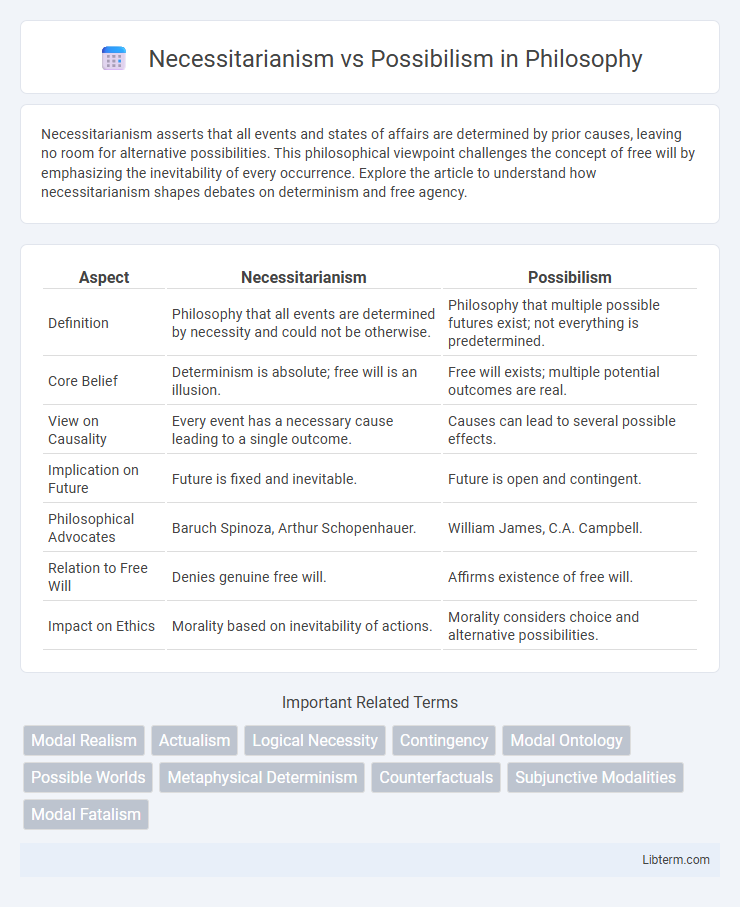Necessitarianism asserts that all events and states of affairs are determined by prior causes, leaving no room for alternative possibilities. This philosophical viewpoint challenges the concept of free will by emphasizing the inevitability of every occurrence. Explore the article to understand how necessitarianism shapes debates on determinism and free agency.
Table of Comparison
| Aspect | Necessitarianism | Possibilism |
|---|---|---|
| Definition | Philosophy that all events are determined by necessity and could not be otherwise. | Philosophy that multiple possible futures exist; not everything is predetermined. |
| Core Belief | Determinism is absolute; free will is an illusion. | Free will exists; multiple potential outcomes are real. |
| View on Causality | Every event has a necessary cause leading to a single outcome. | Causes can lead to several possible effects. |
| Implication on Future | Future is fixed and inevitable. | Future is open and contingent. |
| Philosophical Advocates | Baruch Spinoza, Arthur Schopenhauer. | William James, C.A. Campbell. |
| Relation to Free Will | Denies genuine free will. | Affirms existence of free will. |
| Impact on Ethics | Morality based on inevitability of actions. | Morality considers choice and alternative possibilities. |
Introduction to Necessitarianism and Possibilism
Necessitarianism asserts that all events and states of affairs are determined by preceding causes, leaving no room for genuine alternatives or contingency. Possibilism, in contrast, holds that multiple potential outcomes can exist at any given moment, emphasizing the openness of the future and the reality of alternative possibilities. These philosophical positions address fundamental questions about causality, free will, and the nature of reality.
Defining Necessitarianism: Meaning and Origins
Necessitarianism posits that every event or state of affairs is determined by preceding causes, denying any possibility of alternative outcomes. Rooted in determinist philosophy, its origins trace back to ancient thinkers like Democritus and later, philosophers such as Spinoza, who emphasized causal necessity as a fundamental principle. This doctrine contrasts sharply with possibilism, which allows for multiple potential futures and emphasizes human free will.
Possibilism Explained: Concepts and Foundations
Possibilism centers on the belief that human actions and future events are not predetermined, emphasizing the role of choice and contingency in shaping outcomes. It asserts that multiple potential futures coexist, allowing for genuine alternatives based on decisions and circumstances. This philosophical stance contrasts with necessitarianism by upholding the openness of possibilities rather than inevitability.
Key Philosophical Differences
Necessitarianism asserts that all events and states of affairs are determined by preceding causes, emphasizing a fixed, deterministic universe where alternatives are impossible. Possibilism contrasts this by arguing for the genuine openness of the future, where multiple potential outcomes coexist, highlighting human free will and indeterminacy. The key philosophical difference centers on necessity versus contingency: necessitarianism denies alternative possibilities, while possibilism embraces them as real and meaningful.
Historical Perspectives and Influential Thinkers
Necessitarianism, asserting that every event or state of affairs is determined by preceding causes, traces its roots to ancient philosophers like Aristotle and was further developed by Baruch Spinoza, who emphasized the inevitability of all occurrences within a deterministic framework. Possibilism, championing the open nature of future events and human free will, found support in the works of thinkers like William James and Henri Bergson, who argued for genuine possibilities beyond strict causality. The historical debate between these perspectives reflects foundational questions in metaphysics and determinism, influencing modern discussions in philosophy of science and ethics.
Necessitarianism in Science and Metaphysics
Necessitarianism in science and metaphysics asserts that all events and phenomena are determined by natural laws or causal principles, leaving no room for alternative possibilities. This deterministic viewpoint holds that given the initial conditions and laws of nature, only one outcome is possible, reinforcing the predictability and order of the universe. In metaphysics, necessitarianism challenges the notion of contingency by claiming that everything necessarily follows from prior causes or essential properties, eliminating genuine metaphysical possibilities.
Possibilism in Ethics and Decision-Making
Possibilism in ethics emphasizes the openness of future actions and moral choices, asserting that individuals have genuine alternatives rather than predetermined paths. This perspective supports decision-making processes that account for multiple potential outcomes, encouraging flexibility and creativity in ethical deliberation. Unlike Necessitarianism, Possibilism values the role of free will and contingency in shaping moral responsibility and practical reasoning.
Real-World Applications and Case Studies
Necessitarianism, emphasizing predetermined outcomes, is often applied in legal frameworks where strict adherence to laws predicts case results, such as mandatory sentencing guidelines. Possibilism informs urban planning and climate resiliency strategies by enabling multiple future scenarios to guide adaptive policymaking and resource allocation. Case studies in emergency management illustrate possibilism's role in flexible response planning, contrasting with necessitarian models in automated manufacturing systems that rely on predetermined process controls.
Criticisms and Limitations of Each Viewpoint
Necessitarianism faces criticism for its deterministic outlook, which undermines the concept of free will and limits human agency by asserting that all events are predetermined by necessity. Possibilism is criticized for its reliance on multiple possible outcomes, which some argue leads to indeterminacy and weakens the predictability and explanatory power of philosophical or scientific models. Both viewpoints struggle to balance the tension between determinism and freedom, with necessitarianism risking rigidity and possibilism risking ambiguity.
Conclusion: Reconciling Necessitarianism and Possibilism
Reconciling necessitarianism and possibilism involves recognizing that while necessitarianism emphasizes determinism and causal necessity, possibilism acknowledges alternative potential outcomes and agent autonomy. A balanced view integrates the deterministic laws of nature with the meaningfulness of choices in shaping the future, allowing for both fixed causal chains and genuine possibilities. This synthesis supports a nuanced understanding of reality where necessity governs general conditions and possibilities emerge within those constraints.
Necessitarianism Infographic

 libterm.com
libterm.com